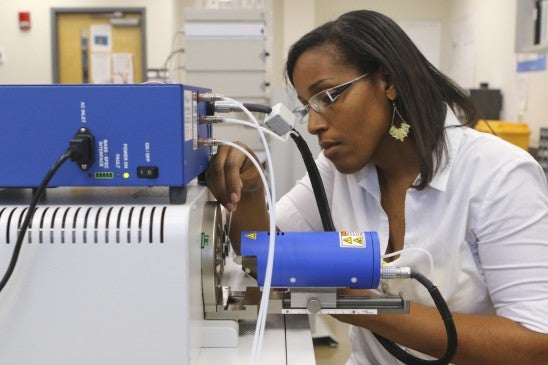Grant to Aid Sexual Assault Investigations
Story courtesy of Gabriel PR

Candice Bridge, Ph.D., a professor at the University of Central Florida (UCF), was awarded a $324,000 grant from the National Institute of Justice (NIJ) to develop new forensic science techniques to aid in sexual assault investigations.
“This grant will enable us to conduct research into a unique new means of identifying perpetrators of sexual assault when traditional DNA evidence doesn’t exist,” says Dr. Bridge. “It’s an important line of research that has become even more important as rapists attempt to elude capture by covering their DNA tracks after an assault” she adds.
Dr. Bridge will be working with instrumentation currently only available to the FBI and a limited number of federal and state forensic laboratories, to investigate ways to identify rapists by means other than DNA evidence. Bridge works alongside her research group of 11 students that investigate lubricants used in sexual assault in addition to research in the areas of drugs, toxicology and gunshot residue.
“An award from the NIJ in forensic science is particularly significant as it’s the primary agency for advancing forensic science through research,” says Bridge.
To pursue the innovative research, Bridge conducted preliminary research to demonstrate to NIJ that there is ample information to distinguish between lubricant samples and that a database of those distinguishing markers would be beneficial to the community. Funding from the NIJ grant will be utilized to support a postdoctoral researcher and one fellowship for a Ph.D. graduate student. Money will also cover tuition, fees, and materials in addition to providing the students stipends.
Bridge has also received a service contract with the Orlando Public Defender’s Office to develop a website that will educate prosecution and defense attorneys on the realities of forensic science analysis. The effort will help the Central Florida court system understand the benefits and limitations of forensic science.
Bridge has also applied for and received an In-House Award from UCF. This award provided seed money for another research idea to understand how the human body can degrade lubricants prior to forensic analysis.
Bridge’s dream of being involved in chemistry began when she was just 13 years old and she stayed the course. She received an American Chemical Society Certified B.S. degree in chemistry at Howard University before obtaining a Ph.D. in analytical chemistry with a focus on forensic science at UCF. She conducted post-doctoral research at the Center for Research and Educational Optics and Lasers (CREOL) at UCF and began teaching chemistry at Howard University shortly thereafter.
She worked at the U.S. Army’s Defense Forensic Science Center, formerly known as the U.S. Army Criminal Investigative Laboratory, before taking her current position at UCF as an assistant professor in the Department of Chemistry.
Other major achievements for Bridge include: holding a Faculty Researcher position at the National Center for Forensic Science (NCFS), teaching Introduction to Forensic Science to nearly 200 undergraduate students and instructing three graduate level courses on the Forensic Analysis of Ignitable Liquids, Forensic Analysis of Explosives and Quality Assurance in Forensic Scientists.
About Candice Bridge
Candice Bridge earned her Ph.D. at the age of 25. She was one of the first people with a forensic Ph.D. in the country, and the first black female to teach chemistry at Howard University and the University of Central Florida. She was voted Professor of the Year in the Howard Chemistry Department in her first year and was selected as one of Ebony magazine’s 30 Under 30 Leaders. She developed and managed the only Human Research Protection Program in the entire Department of Defense that can review and manage prisoner research.
